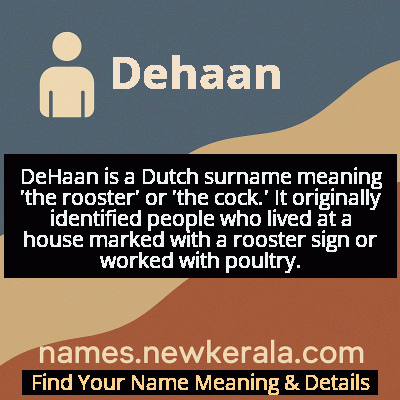Dehaan Name Meaning & Details
Origin, Popularity, Numerology Analysis & Name Meaning of Dehaan
Discover the origin, meaning, and cultural significance of the name DEHAAN. Delve into its historical roots and explore the lasting impact it has had on communities and traditions.
Name
Dehaan
Gender
Male
Origin
Dutch
Lucky Number
6
Meaning of the Name - Dehaan
DeHaan is a Dutch surname meaning 'the rooster' or 'the cock.' It originally identified people who lived at a house marked with a rooster sign or worked with poultry.
Dehaan - Complete Numerology Analysis
Your Numerology Number
Based on Pythagorean Numerology System
Ruling Planet
Venus
Positive Nature
Harmonious, responsible, caring, and artistic.
Negative Traits
Overly idealistic, superficial, possessive, or jealous.
Lucky Colours
Pink, turquoise.
Lucky Days
Friday.
Lucky Stones
Diamond, turquoise.
Harmony Numbers
2, 3, 9.
Best Suited Professions
Artists, musicians, teachers, healthcare workers.
What People Like About You
Warmth, nurturing nature, artistic flair.
Famous People Named Dehaan
Thomas DeHaan
Actor
Known for roles in independent films and television series, particularly in Dutch-American productions
Jacob DeHaan
Composer
Renowned Dutch composer of wind band music and educational compositions for young musicians
Michael DeHaan
Software Developer
Creator of Cobbler and Ansible, influential open-source software for system administration and automation
Name Variations & International Equivalents
Click on blue names to explore their detailed meanings. Gray names with will be available soon.
Cultural & Historical Significance
As Dutch settlers migrated globally during the colonial period and subsequent waves of immigration, the DeHaan surname spread to North America, South Africa, and Australia, often maintaining its distinct Dutch identity while adapting to local linguistic patterns. The name carries with it the legacy of Dutch resilience, maritime tradition, and agricultural expertise. In modern times, it serves as a cultural marker connecting diaspora communities to their Dutch heritage, while also representing the successful integration of Dutch immigrants into diverse societies around the world.
Extended Personality Analysis
Individuals bearing the DeHaan name are often perceived as possessing qualities associated with the rooster symbolism—alertness, confidence, and natural leadership. They tend to be early risers with strong organizational skills and a protective nature toward their family and community. The Dutch cultural influence suggests practical, no-nonsense individuals who value honesty and direct communication. Many DeHaans demonstrate entrepreneurial spirit and resilience, traits that served their ancestors well through periods of Dutch history marked by land reclamation and maritime trade.
There's often a blend of traditional values with innovative thinking, reflecting the Netherlands' historical balance between conservatism and progressive attitudes. Family loyalty and cultural heritage typically remain important to those carrying this surname, even generations after immigration. The name suggests someone who is dependable, hardworking, and community-oriented, with a strong sense of responsibility and the courage to speak up when necessary. These personality associations have been reinforced through generations of family stories and cultural transmission, creating a collective identity that many bearers of the name consciously or unconsciously embody.
Modern Usage & Popularity
In contemporary times, DeHaan remains primarily a surname rather than a given name, though it occasionally appears as a first name in Dutch-American families honoring their heritage. The name maintains moderate frequency in the Netherlands and among Dutch diaspora communities in the United States, Canada, and South Africa. While not among the most common Dutch surnames, it has stable usage patterns with occasional spikes in popularity when notable individuals with the name gain public attention. In recent decades, the name has become more familiar internationally through figures in technology, arts, and business. Many bearers have anglicized the spelling to DeHaan or Dehan in English-speaking countries, though traditional Dutch families often preserve the original 'De Haan' spelling with the space. The name continues to serve as an important cultural identifier while adapting to globalized naming conventions.
Symbolic & Spiritual Meanings
The name DeHaan carries rich symbolic meaning derived from its association with the rooster. Symbolically, it represents awakening, vigilance, and protection—the rooster's crow heralds the dawn and new beginnings. In many cultures, including Dutch tradition, the rooster symbolizes courage, honesty, and territorial protection. The name also conveys agricultural roots and connection to the land, reflecting the Netherlands' strong farming heritage. Metaphorically, it suggests someone who 'crows' or speaks truth boldly, a natural leader who alerts others to important developments. The protective aspect symbolizes family loyalty and community guardianship, while the dawn association indicates optimism and the ability to initiate new ventures successfully. These symbolic meanings have been reinforced through centuries of cultural association and family tradition.

